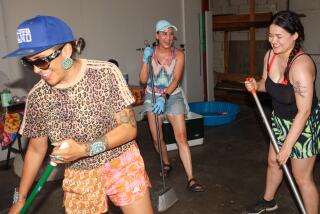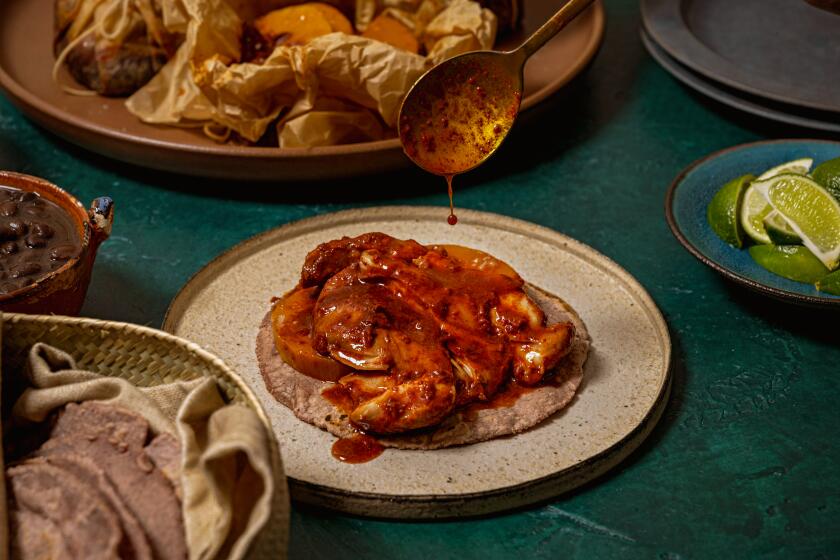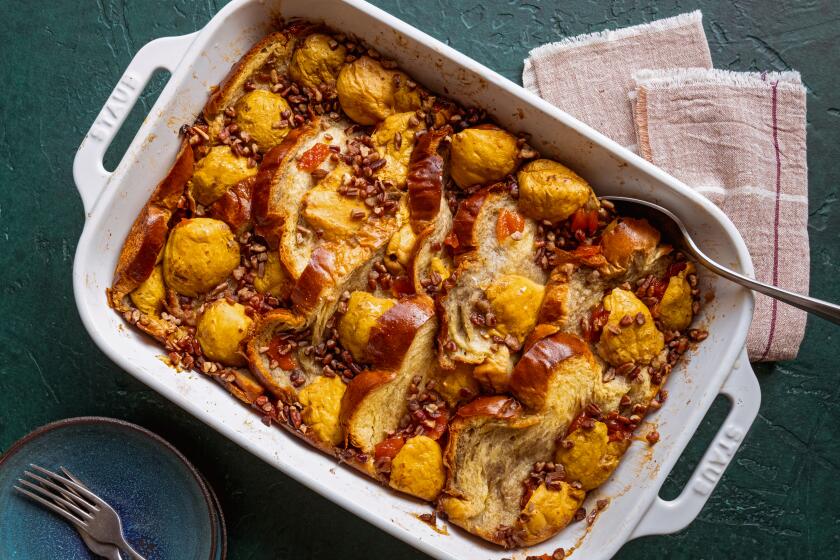How Crowns & Hops is building a Black-owned craft beer brand — and a community
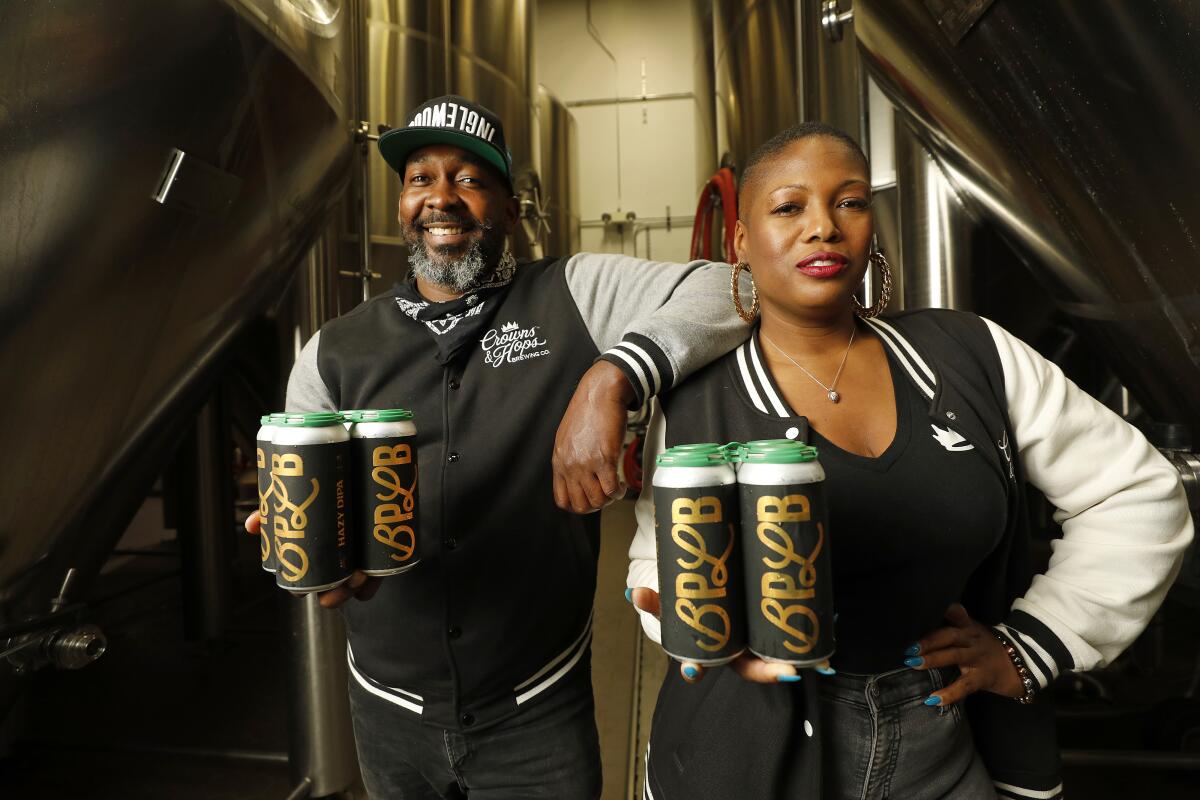
Crowns & Hops doesn’t want to be the only Black-owned brewery you love.
By the time the brand-turned-brewery opens its long-awaited facilities and taproom in Inglewood, founders Beny Ashburn and Teo Hunter will have partnered with dozens of Black-owned brewers and artists and musicians and designers, simultaneously repping and creating community.
Really, they just want everyone to feel welcome — especially in the craft beer world, where ownership and consumers are predominantly white.
“I had almost accepted the fact that I was going to be the only Black dude in a room almost every time,” Hunter said. “It was just what it was.”
Through Instagram posts, YouTube videos, beer-festival coverage and merch drops, Crowns & Hops — originally called Black People Love Beer, and, later, Dope & Dank — has strategically built a following over the last few years, popping up at first in barber shops and sneaker stores where the owners believed Black and brown people would feel comfortable.
Craft beer can be a welcoming community of its own, but Ashburn says there are multiple cultural barriers that present hurdles for Black and brown drinkers who’ve grown up with beer from mega-brewers and never visited independent breweries.
“Our best place to congregate is either a personal family event and/or a club, or you’re standing on the corner with a brown bag,” said Ashburn. “For me, I grew up in New York; I’m used to seeing people with 40 ounces in brown bags, which is a way to hide it, because you don’t want to get caught … and we wanted to make that change.”
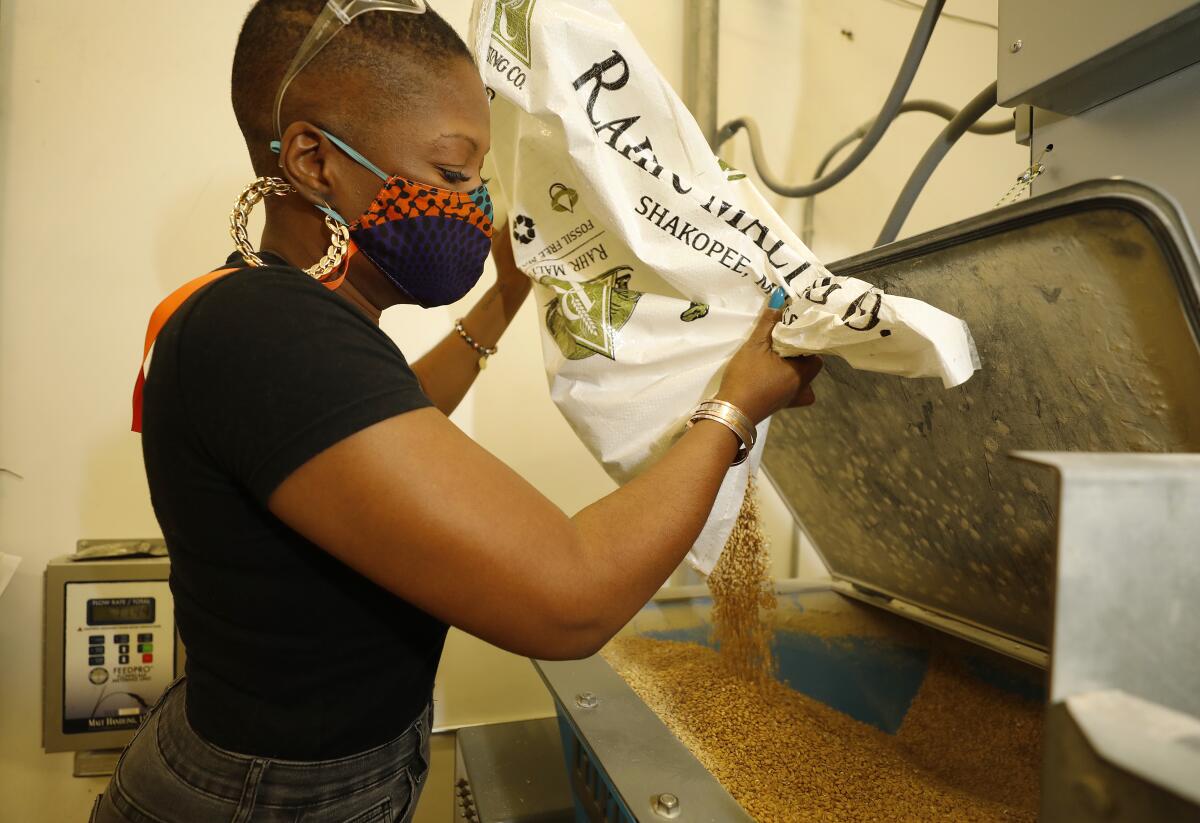
A dating app linked Hunter, whose love of craft beer began in the aughts when a friend left a Dead Guy Ale in his cooler after band practice, with Ashburn, a marketing veteran who didn’t care much for beer and grew up never knowing much about it, beyond the sips of Heineken she would sneak from her mom at barbecues. They didn’t work out romantically, but the pair became business partners and formed a marketing and events platform and hype machine for Black and brown brewers and other entrepreneurs. (“We’re the most unsuccessful successful Tinder story ever,” Hunter joked.)
In 2020, that partnership expanded to include the launch of their own line of canned craft beer, which they brew through two contract facilities: HenHouse Brewing Co. in Santa Rosa, and Three Weavers Brewing Co. in Inglewood. Hunter develops the recipes for Crowns & Hops with the aid of consultant Jon Carpenter, while Ashburn oversees marketing and brand strategy. Together, they’ve placed Crowns & Hops on shelves of roughly 350 retailers in the last year and, this month, they started kegging their beer for rollout to Southern California bars.
“The momentum has been really incredible and a source of pride for anyone in the area that’s believed in what they’re doing,” said Alexandra Nowell, brewmaster and co-founder of Three Weavers. “They have the intent, and they have the integrity. Those are two things that are incredibly important to me when it comes to looking at other breweries, because there’s a lot of misaligned and contrived ideas and individuals behind a lot of these businesses, and [they don’t] don’t pay the proper homage to the beer.” Crowns & Hops, she said, has “the full package, really.”
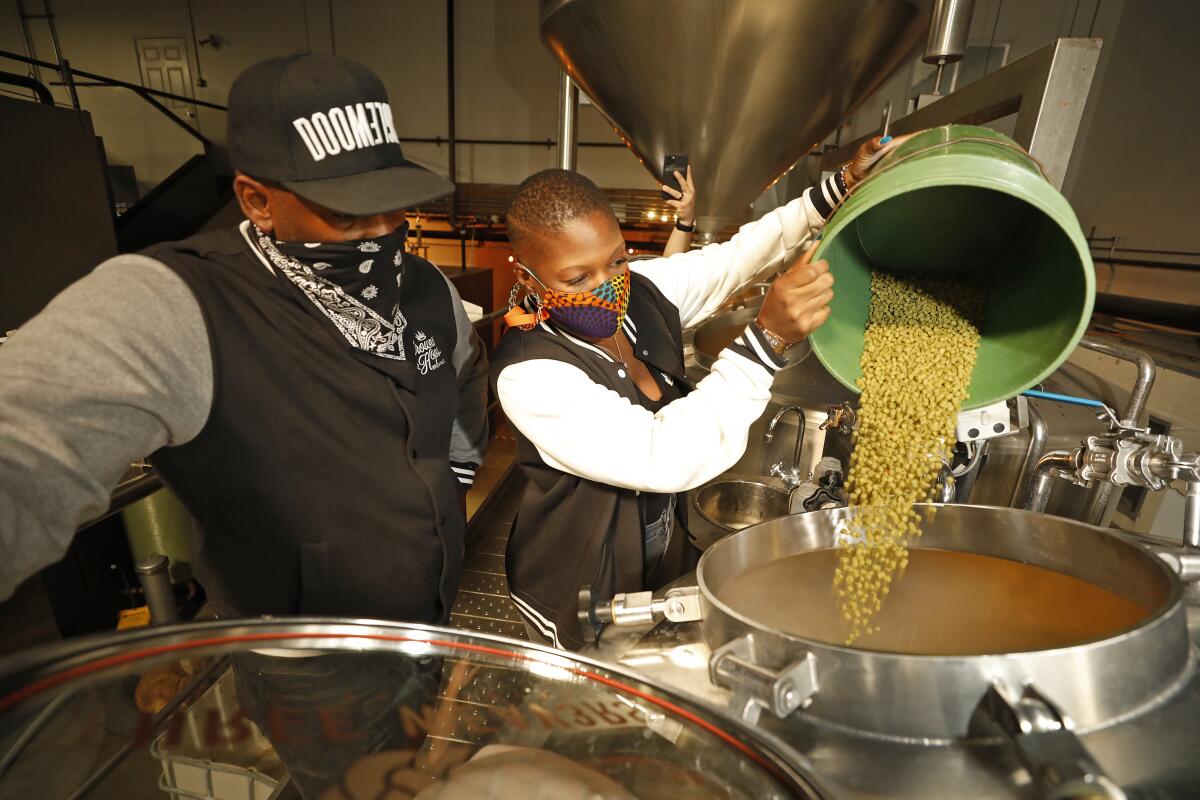
Nowell has seen increased interest in Inglewood’s beer scene. There’s room to grow, but even though the city is home to vacant commercial properties ripe for breweries, the cost is often prohibitive — all over Southern California — for large and resource-heavy businesses, and rents are high.
While cost is a hindrance, so is access to business know-how.
According to a 2019 Brewers Assn. survey, 88% of craft brewery owners are white; in contrast, Black brewery owners make up only 1% in the study’s findings.
“A lot of these brewery owners are partners with someone who’s in finance or someone who’s a lawyer, “Ashburn said. “It’s all of those smart business resources you need to start any business … and I don’t think those same opportunities are available to people of color, and if they are, opening a brewery is definitely not going to be the first business choice if there is capital available, most likely because craft beer hasn’t been part of our culture pretty much ever — it’s always been big beer.”
What’s more, Hunter and Ashburn say, beer is often tied to gentrification — white gentrification, which has prompted discussions on how they could build a new facility without driving up costs and while preserving the neighborhood’s culture.
“One of the first signs of an area gentrifying is a craft brewery,” Hunter said. “It is businesses or individuals that do not know or aren’t from these communities that set up shop with no attribute or affinity or tie to the culture that is already there. I think that’s what separates what we’re doing. We are putting in a new business model and showing ... that we can also be a part of what we consider [to be] revitalization of our neighborhoods.”
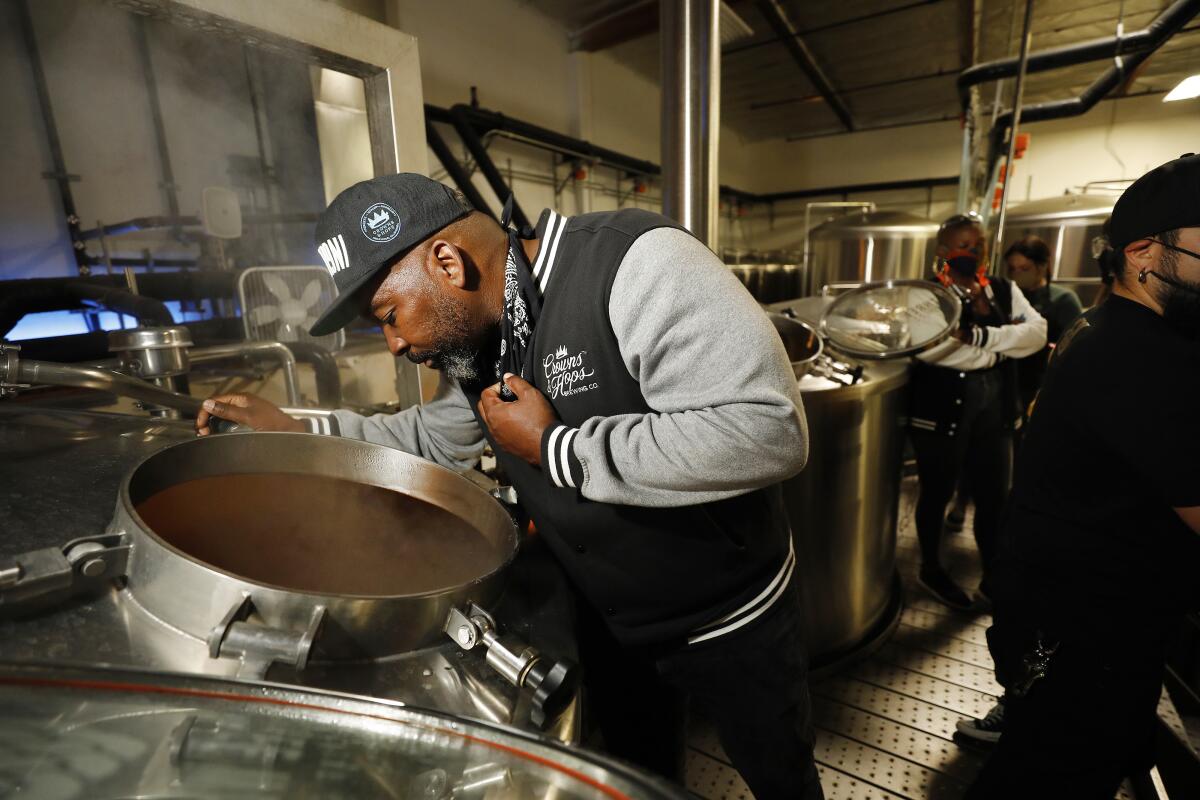
Hunter, who was born in Inglewood, wanted to return to the city and bring a business for Black and brown beer lovers, one that could provide inspiration to others that the same pathways to entrepreneurship are open to them too.
Ashburn and Hunter worked to build a relationship with the city of Inglewood. Visiting the municipal buildings, they said, was like visiting their aunts and uncles. That the leadership looked and sounded like them signaled that they were making the right call.
They are still working to lock down the space for their business and more funding. In 2019 they launched an online fundraiser, which raised nearly $77,000 and helped their canning operation get off the ground. BrewDog, a Scottish brewery that often invests in independent beer operations, invested in the company through a development fund.
Throughout the process, meetings with potential investors sometimes have gone off the rails. Proposed business arrangements would seem equitable, but then Ashburn and Hunter said they would then be presented with terms that were unacceptable. Sometimes investors didn’t want just a stake in the brand — they wanted gross sales too, leaving the founders with almost nothing.
“Prior to Black Lives Matter, to being something people understand — in terms of the why and the significance of it — there were a lot of very predatorial offers made that I think made this process a little longer than we had anticipated,” Hunter said. “What we learned through this process of raising capital is that all money is not good money, and you have to work with people who want to see you succeed, not just people that want to make a quick buck off of you.”
“You need to know your value,” Ashburn added.
The pair are considering a mix of crowdfunding, loans, grants and private investors — people aligned with their values, steeped in community — to help finance their facility, with plans for a new campaign to launch late this year.
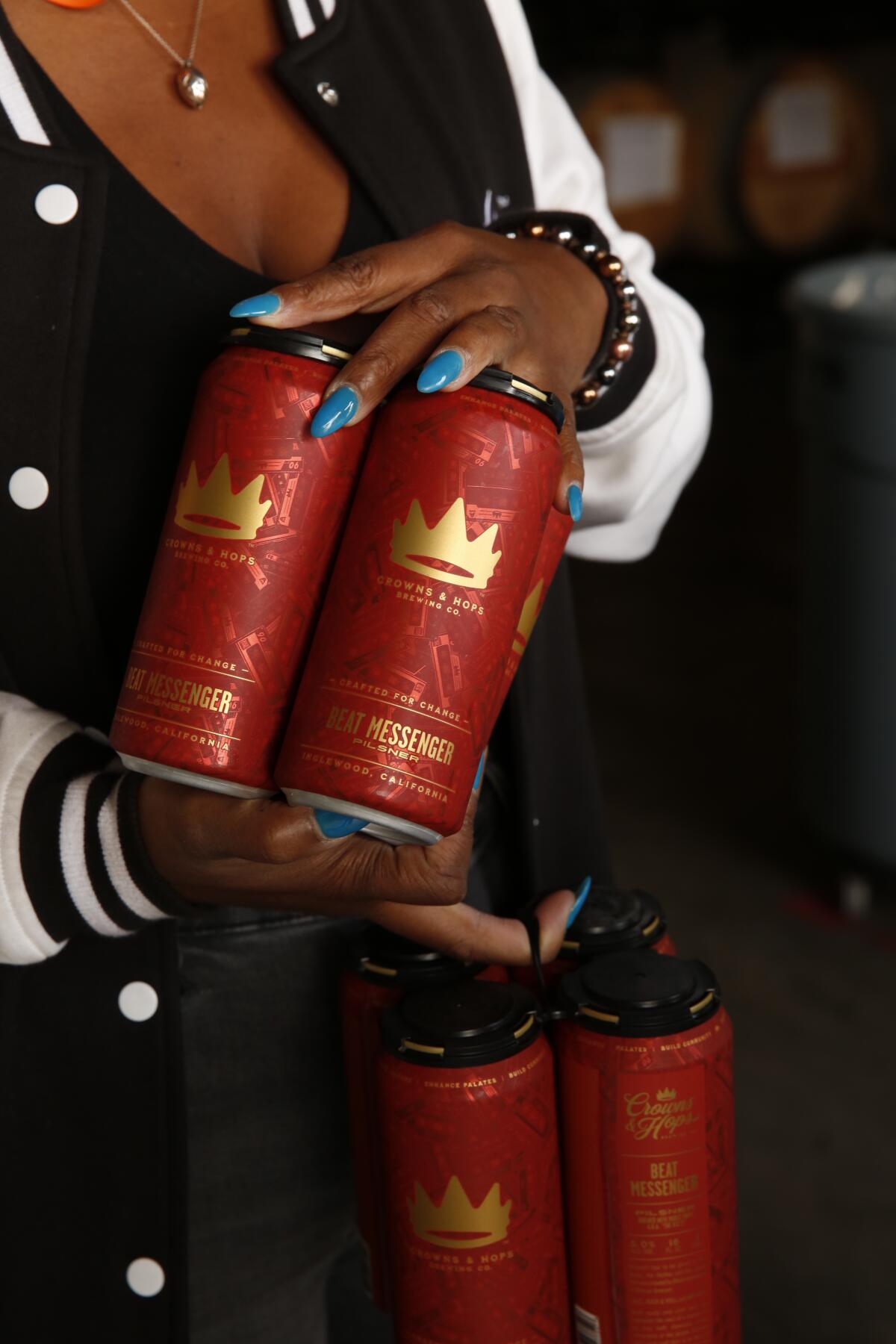
They want their own taproom and a midsize, 15-barrel production system at the very least; eventually, they hope to supply their distribution outlets with beer made on their premises — and to grow.
Crowns & Hops is set to be available, at least by the can, in the new SoFi Stadium, and the entrepreneurs are aiming for their brewery space to be located nearby — as well as open in time for the Super Bowl to be held at the stadium on Feb. 13, 2022.
When they do open their own brewing facility, they envision an atmosphere that’s welcome to all, even for those who don’t love craft beer or don’t drink. They want a taproom and a large outdoor area with music and an aesthetic and vibe that harks back to their childhood experiences. Artists like J Dilla and Kendrick Lamar will be on rotation while families play games you might not see at other breweries, like dominos (a favorite of Hunter’s).
Currently, Crowns & Hops has more than 20 beer recipes, according to Hunter, who likens the development process to a kind of grain-and-hops Rubik’s Cube. Ideally, the brewery will launch with a mix of these beers, a portfolio with a pilsner, a lager, stouts, stouts with adjuncts, IPAs and hazy IPAs. Because so many members of the community have told Ashburn and Hunter they’ve discovered craft beer through the brand or its events, the duo want to offer a range of styles for people who might be new to exploring craft beer.
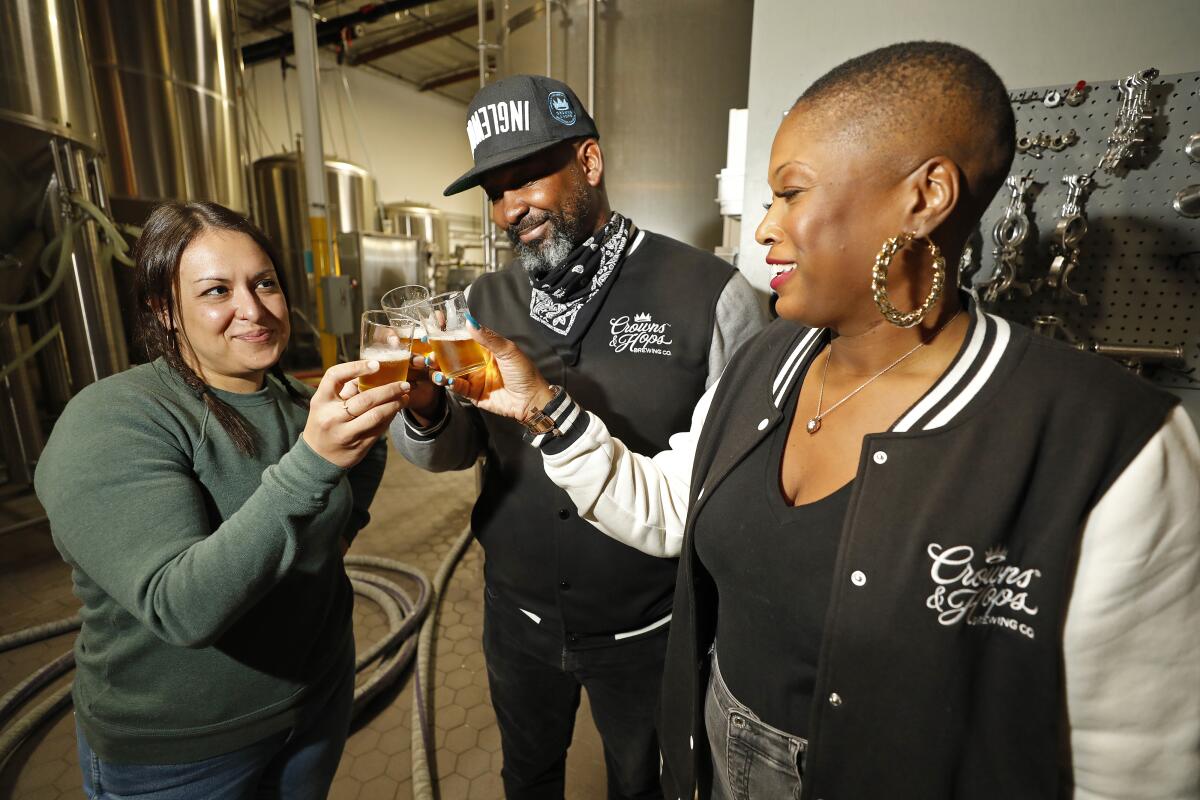
For now, they’ll continue brewing out of Inglewood and Santa Rosa, hosting events and collaborating with Black- and brown-owned businesses and artists. Their next release, set to drop at the top of June, is a special edition of their hazy IPA, BPLB, in honor of Juneteenth, a holiday that celebrates emancipation and the end of slavery within the United States.
“That’s a moment where, for once, it’s about getting it right,” Hunter said. “That day literally represents a turning point for our country going, ‘You know what? Not in that direction anymore.’”
We’re not where we should be, he says, but it’s important to celebrate the victories. This year, Ashburn and Hunter will be celebrating with their own beer in hand.
More to Read
Eat your way across L.A.
Get our weekly Tasting Notes newsletter for reviews, news and more.
You may occasionally receive promotional content from the Los Angeles Times.
